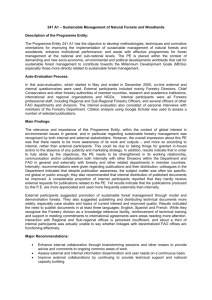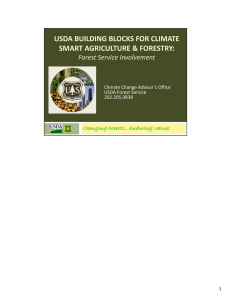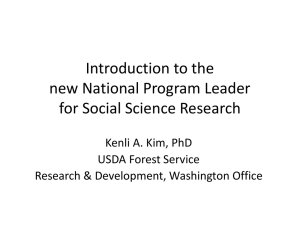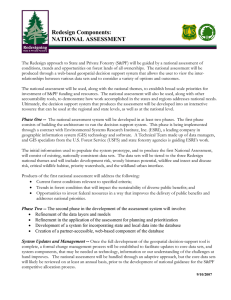Forestry Research Advisory Council August 24, 2014
advertisement
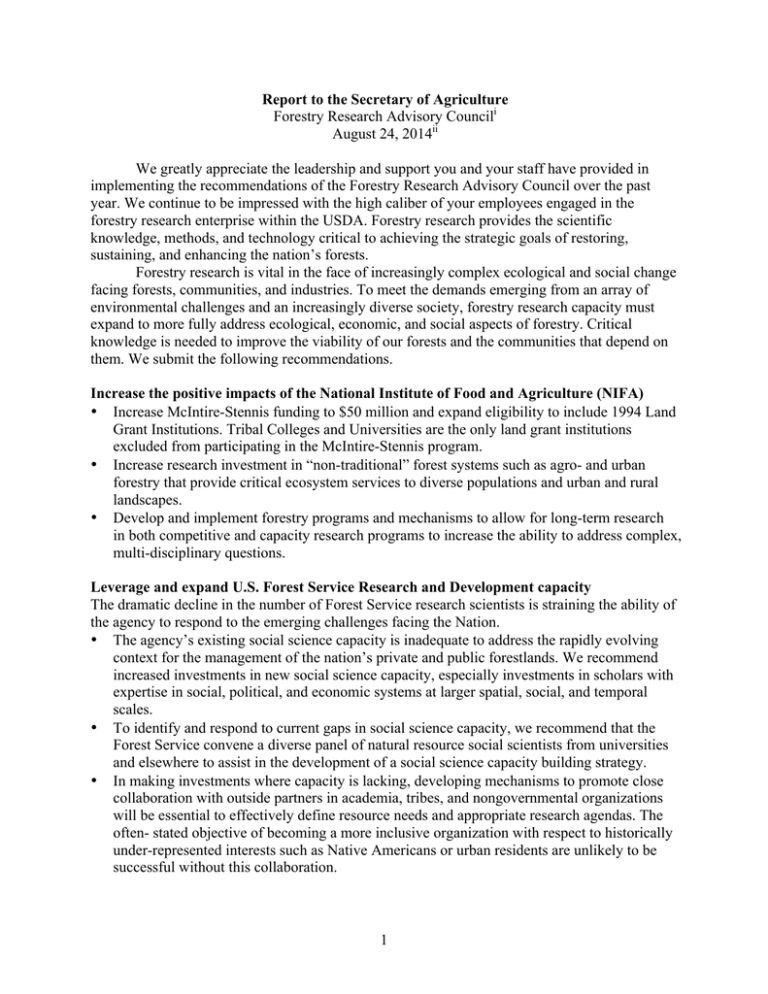
Report to the Secretary of Agriculture Forestry Research Advisory Councili August 24, 2014ii We greatly appreciate the leadership and support you and your staff have provided in implementing the recommendations of the Forestry Research Advisory Council over the past year. We continue to be impressed with the high caliber of your employees engaged in the forestry research enterprise within the USDA. Forestry research provides the scientific knowledge, methods, and technology critical to achieving the strategic goals of restoring, sustaining, and enhancing the nation’s forests. Forestry research is vital in the face of increasingly complex ecological and social change facing forests, communities, and industries. To meet the demands emerging from an array of environmental challenges and an increasingly diverse society, forestry research capacity must expand to more fully address ecological, economic, and social aspects of forestry. Critical knowledge is needed to improve the viability of our forests and the communities that depend on them. We submit the following recommendations. Increase the positive impacts of the National Institute of Food and Agriculture (NIFA) • Increase McIntire-Stennis funding to $50 million and expand eligibility to include 1994 Land Grant Institutions. Tribal Colleges and Universities are the only land grant institutions excluded from participating in the McIntire-Stennis program. • Increase research investment in “non-traditional” forest systems such as agro- and urban forestry that provide critical ecosystem services to diverse populations and urban and rural landscapes. • Develop and implement forestry programs and mechanisms to allow for long-term research in both competitive and capacity research programs to increase the ability to address complex, multi-disciplinary questions. Leverage and expand U.S. Forest Service Research and Development capacity The dramatic decline in the number of Forest Service research scientists is straining the ability of the agency to respond to the emerging challenges facing the Nation. • The agency’s existing social science capacity is inadequate to address the rapidly evolving context for the management of the nation’s private and public forestlands. We recommend increased investments in new social science capacity, especially investments in scholars with expertise in social, political, and economic systems at larger spatial, social, and temporal scales. • To identify and respond to current gaps in social science capacity, we recommend that the Forest Service convene a diverse panel of natural resource social scientists from universities and elsewhere to assist in the development of a social science capacity building strategy. • In making investments where capacity is lacking, developing mechanisms to promote close collaboration with outside partners in academia, tribes, and nongovernmental organizations will be essential to effectively define resource needs and appropriate research agendas. The often- stated objective of becoming a more inclusive organization with respect to historically under-represented interests such as Native Americans or urban residents are unlikely to be successful without this collaboration. 1 • • • • • The Forest Service’s recent creation of a center of excellence in economics is promising and we recommend consideration of extending this organizational model to address other elements of its social sciences research agenda. It is critical that the Forest Service leverage existing personnel with different research station affiliations to focus on common problems together. Forest Inventory and Analysis is critical to making informed decisions on management of public and private forests. FIA data are being used for an increasing diversity of research applications. We recommend maintaining current FIA sampling intensity and remeasurement cycle to meet current and future needs. To accelerate integration of research efforts across agency boundaries, particularly with respect to “big data” issues such as climate change, extreme events, and landscape ecology, we believe that it is critical that Forest Service R&D develop new organizational mechanisms that link individual research stations’ personnel and overall R&D strategic plans. Forest Service R&D and its university partners continue to be negatively impacted by the annual practice of “fire borrowing.” We urge the USDA to accelerate efforts to define and implement funding mechanisms acceptable to the Congress that would provide more nearterm stability for research funding. Public-private research partnerships are needed to leverage resources to address the needs of forestland and the rural and urban citizens who receive the land’s social, environmental, and economic benefits. Such cooperative research will help accommodate for the severe reductions that have occurred in funding for both public and private forest research and will produce positive synergies beyond what either entity could create alone. Support forests and forestry across all lands with research and development investments There are a number of research topics that we believe need particular attention to support the Administration’s All-Lands Approach. • Decision support and data visualization tools similar to the iTree (for urban forests) are needed to help diverse populations understand forest health, forest resilience, and ecosystems in rural forestlands. • Research is needed to develop new forest products and advanced manufacturing, increase sustainability of timber production, improve wood product life cycles to more efficiently use the resource, and enhance marketing of traditional and new wood products. • Market and technology research is needed to understand the markets and the attitudinal, demographic, and consumption trends that drive them, including traditional wood products and the emerging bio-economy, sustainable building, and “buy local” markets. i The members of the Forestry Research Advisory Council (FRAC) are: George Brown, Nicole Cavender, Kevin Cheung, Melissa Cook, Daniel Dructor, Alexander Evans, Myron Floyd, J. Keith Gilless, Shibu Jose, Henry Kodama, Adrian Leighton, Cassandra Moseley, Eric Norland, Shannon Ramsay, Ronald Reed, Carlos RodriguezFranco, Robert L. Smith, Eric Vance, and Charles “Buck” Vandersteen ii The Council met in Washington, D.C. on February 20 - 21, 2014 and June 19 - 20, 2014. 2


